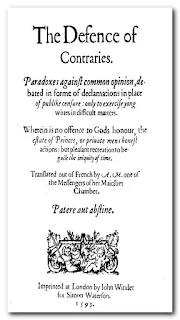Who else than Marlowe lost his worldly honours
and reflected on the relation between Banishment and Liberty?
_______________________________

Basically it makes no logical sense whatsoever, that one of the world most ingenious eloquent literary person Christopher Marlowe left nothing in writing (in printed form) during his [assumed] lifetime of 3 decades, analog to Shakespeare [of the same age] for the first 3 decades of his life.
The prolific genius' must have written on a daily base!! ...and must have started at an early age (for Marlowe or Shakespeare it would be the year 1579, when a certain "Antony Munday" composed “The Mirror of Mutability" dedicated to Edward de Vere.
If we discuss the idea that for security and safety reasons endangered Marlowe wrote under pseudonyms or pennames, and lets assume for a moment one of his penname was "Antony Munday", how would you imagine the literary abilities of a 15 year old boy, 1579?
The prolific genius' must have written on a daily base!! ...and must have started at an early age (for Marlowe or Shakespeare it would be the year 1579, when a certain "Antony Munday" composed “The Mirror of Mutability" dedicated to Edward de Vere.
If we discuss the idea that for security and safety reasons endangered Marlowe wrote under pseudonyms or pennames, and lets assume for a moment one of his penname was "Antony Munday", how would you imagine the literary abilities of a 15 year old boy, 1579?
There is no scientifically precise definition of genius. In any case it is a person who early displays exceptional intellectual ability as giftedness creativity, or originality, to a degree that is associated with the achievement of new advances in a domain of knowledge.(e.g. in music, literature , mathematics etc...).
The level of IQ is sufficient for development of genius only when combined with other influences or abilities of one who performs at a remarkably high level of accomplishment when compared to others of the same age.
_________________________________________________________________________________
Click and listen to a section of Mozarts first opera -->Apollo et Hyacinthus he composed at the age of 15 (1771).-- a remarkable piece of music!
Can you imagine that anyone could write an opera of such quality at an age of 15?. -
By that time Mozart had travelled extensively through much of Europe and he had been able to hear performances of works by many of the most celebrated composers of the day, ...
and when he returned home in December 1766, a few weeks before his 11th birthday, he had written numerous symphonies, sonatas and arias of his own.
_______________________________________________________________________________|
|
| Antony Mundays "Defence of Contraries" (Paradoxes against common opinion) 1593 |
Declamation 6 "For him that has lost his wordly honours and preferments" ..."That man ought not to be greeved ,though he be despoiled of his goode and honours")
Declamation 9 "For the exiled. That it is better to be banished, than continue in Liberty!"
All coincidence? Is there really nothing equivalent for Marlowe/Shakespeare? (if he wrote for security or safety reasons under changing pseudonyms like Anthony Munday?)
----
"Apollo and Hyacinthus", Mozarts First Opera, written at the age of 15 (1771)



